Interview: Peter Hossli
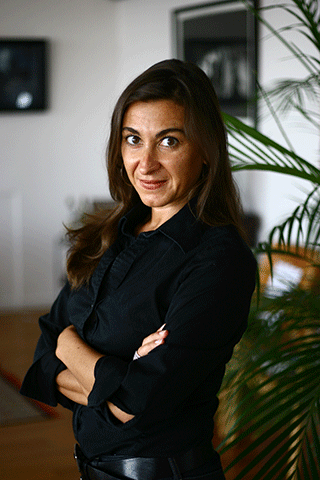
Ms. Addario, you felt your unborn son for the first time when you entered Somalia. What went through your head?
Lynsey Addario: It was a very difficult time for me. I was ambivalent about being pregnant. And I was in denial. I knew I wanted a family, but as a woman with this profession I couldn’t figure out how I would manage it while being on the road all the time. And there were no women who did what I do, who had families. So I really didn’t have any role models.
And how did you deal with your ambivalence?
I kept working in all the places I usually worked.
Somalia is one of the most dangerous places in the world. Some people would say you’re careless.
People making those comments are forgetting that women are pregnant and giving birth every single day in Somalia. Why don’t you care about the women in Somalia who are pregnant and giving birth under those conditions?
But are you careless?
I don’t think of myself as careless. I went there to cover the drought, which was not fighting, and it was a four-day trip.
Still, you put yourself and your child in danger.
I wasn’t having any complications with my pregnancy. I was very healthy. If they’re so angry with a journalist going in there for four days they should really focus their energy on women in Somalia.
In Somalia, you photographed children with medical needs. They needed a doctor. What could you do with a camera?
Well, I’m a journalist. Basically. I’m comfortably photographing people who are in need of a doctor. If I show their condition and show the fact that there are hundreds of children suffering from malnutrition at the height of the drought in the Horn of Africa, then aid agencies will go in or policy members will do something to help people. For me, the greatest tool I have is my camera.
A journalist’s work is her life. It defined who we are. It’s not just a job. What is it for you?
I’m not doing this job for money. I’m doing this job because I believe in it. People need to see what’s happening to other people around the world. People need to have perspective, when there are humanitarian crises, human rights abuses, or war. It’s our responsibility in the developed Western world to look at these things and to see what we can do to help.
You were photographing a child dying while you felt your son kicking inside you. What happened at that moment?
It’s devastating and traumatic to watch a child die whether I’m pregnant or not. The fact that I was pregnant and my son was kicking inside me, that just made it all the more devastating. But for me, I would rather be there with my camera and feel like I’m doing something to help those people than sit back at home in my privileged existence without doing anything.
How does being a mother change your understanding of the suffering you’ve covered?
It’s just enhanced my understanding. I’ve always been extremely compassionate and I’ve always tried to understand what people are going through. But I think, as a mother I can now really understand that bond and that visceral sort of need to keep your child alive and healthy, provide them with the safety and all of the things a child needs.
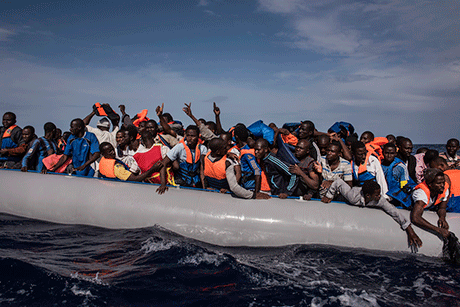
I’m not really working on the front line any more. I continue to work in war zones. I’m working in Iraq and Afghanistan and all those places, but I’m sort of a step back. I’m focusing more on civilians; I’m focusing on refugees a lot. So I’m trying to do the work from a little removed.
Journalists say that you’re only as good as your last story…
… sure…
… how afraid were you that you wouldn’t be as good anymore once you had a child?
Oh, I was terrified. I was so ambivalent about getting pregnant because I just didn’t understand how I would continue to do the work and be a mother. I didn’t know if I’d still be able to travel, if I’d even be able to leave my son. In my entire adult life, all I cared about were my stories.
You have a tremendous work ethic. What drives you?
I put an extraordinary amount of pressure on myself. My parents are extremely hard working. They raised us with an incredible work ethic. My grandparents are Italian. One of my grandmothers came over to Ellis Island from Southern Italy. My grandparents were very poor. And so they had to work very hard for everything they had. And so maybe that sort of struggle, that work ethic, came from there.
How do you turn it off?
I don’t know. I wish I did.
Some war photographers are adrenaline junkies. And you?
If I’m in a combat situation and being shot at, obviously I feel the adrenaline. Everyone does. It’s a natural byproduct of combat. But for me, it’s more about the story; it’s about getting to the place where I need to tell these stories, be a messenger, get the word out. And those are the things that drive me. Adrenaline is certainly present in combat, but I’d say combat is like, you know, five percent of what I do.
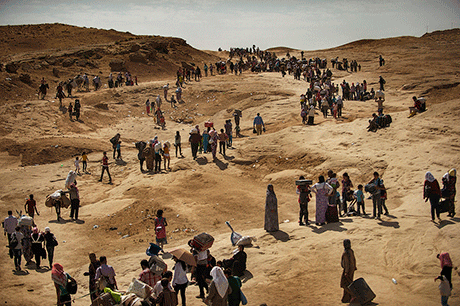
… I’m always sort of confused by the war photographer title, because I honestly I don’t think I’m a very good combat photographer. I happen to have worked in a lot of war zones, but that’s primarily because I was doing other stories on civilians that happen to be in war zones.
Why don’t you like to be called a war photographer?
It doesn’t seem to fit me. There are a lot of photographers who dedicate themselves exclusively to war. I’m not one of them. Even when I’m in a war zone, I’m rarely focusing on combat.
When a tragedy begins, you are there. Isn’t this an addiction?
No. I think it’s a calling. I do it for a living, I believe in it, and I see the impact I’m making – I see the ability to educate people, to help people, to get policy makers to react – and then suddenly I can’t stop. It’s certainly not about the bravado. It’s very frustrating to me when people use the word addiction. It’s such a superficial, dismissive way of talking about people who have dedicated their lives to something so much more important.
Robert Frank once told me that when he started out, people would let him photograph them, but now nobody wants to grant him a picture. How do you gain people’s trust?
On a feature story I really take the time to talk to people, to explain why I’m there, why I think it’s important to tell their story. I spend a lot of time without taking any pictures. By the time I actually go to shoot, people do feel comfortable and they understand what I’m looking for. Just last week was in India and I was photographing maternal-health issues. It’s a very intimate story. A lot of the time I’m just talking to the women, I’m hanging out. I’m not going in there with sort of my camera blazing in people’s faces.
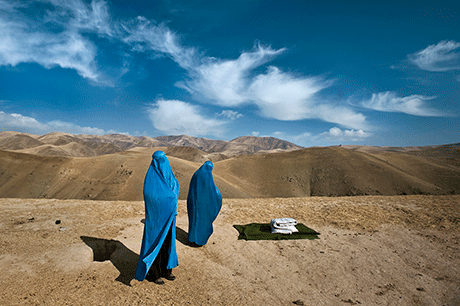
In a conflict zone, I just think it doesn’t matter if you’re a man or a woman. Things are happening very quickly and it’s really just a matter of how quickly you move and what you’re looking for.
You work a lot in Muslim countries. How difficult is it being a woman there?
When I’m working on feature stories in the Muslim world, it’s a huge advantage being a woman, because obviously these societies are segregated by gender and so I have great access to women.
You were kidnapped in Iraq, and later in Libya. Who do you blame for this?
The blame is mine. I knew what I was getting myself into. You cover a war and there are dangers. We accepted this as journalists – that these things can happen, especially in Libya. I’m grateful I’m still alive.
Why did you feel guilty for getting better treatment than the kidnapped men did?
I could hear my male colleagues grunting while getting smashed in the back of the head with gun butts, and I just thought, why is it fair that I’m being spared this kind of physical abuse because of my gender?
You were groped. Wasn’t that just as horrible?
Of course it was disgusting and horrible and terrifying because I kept thinking, will this lead to rape? But I could hear my male colleagues and I just felt like, clearly, I’m not getting that treatment because I’m a woman. And so, I felt guilty that I was being spared that kind of abuse.
You were terrified of getting raped, but you weren’t. How do you explain that?
I was with my three male colleagues, and I was not separated from them, fortunately. One night a guy came and opened the door when we had all fallen asleep, and I heard the door sort of clanking. And he grabbed my feet and started trying to pull me out of the cell alone. And I inched up to Anthony Shadid, who was lying next to me, and I sort of spooned him like as if he were my husband, and I said, «Anthony». The guy just looked at us and walked out.
You photographed a woman that was raped by nine men. How can you absorb that much pain?
I try and channel it in my work, and I try and channel it in getting those pictures out there. It’s not about me seeing all these horrible things. It’s really about trying to help the people I’m photographing.
You have not only seen violence, you have seen evil. How has this affected your view of humankind?
I don’t experience these things in a vacuum. I carry them with me everywhere I go. I’ve seen that human beings are capable of the most violent, aggressive and evil forms of behavior. But I also see that they’re capable of the most wonderful and generous, the exact opposite.
How important is it for you to be neutral when you’re in a conflict zone?
It’s everything for me. My job is to document what I see and put it out there. Of course I have my own opinions but I actually don’t care where your loyalties lie. My job is to get your interview, take your photograph, give it to the New York Times, and give it to National Geographic.
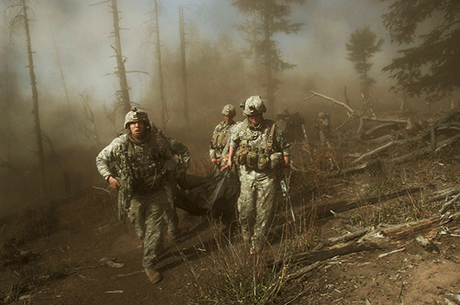
It affects me tremendously. That is another reason why I’ve sort of slowed down a little bit in terms of covering war. Being a mother has had an effect, but losing a lot of friends does take a toll. I don’t want to walk away from this job, but I need to sort of redraw the boundaries and figure out how I can keep working and working in a way where I’ll stay alive.
How do you stay alive when bullets are flying or when you are in a dangerous situation?
I’m the first person flat on my stomach hiding, finding a place to hide. My combat pictures are not very good because I’m not taking many pictures.
But how do you stay alive?
Some of it is luck. Some of it is being very quick to find cover and to stay down. And, I think it is just having some knowledge and experience on where to go.
What are you willing to sacrifice for a good photograph?
For me, the first priority is to stay alive, because if I’m dead, I can’t do anything. The second issue is to try and get in a position where I have cover, I’m shielded by something, whether it’s a wall or rocks or something and to try and shoot from that position. If it’s not possible to get cover, then I’m going to leave.
Why does the death of a journalist in a war zone make much more news than a civilian’s?
It’s sad. A life is a life. It doesn’t matter if you’re a journalist or a civilian. When we lose human lives, it’s horrible. Personally, I feel more connected when I hear that a journalist has died because I feel like we are a family. Journalists provide an important service for our society. They should be respected as neutral observers and should not be targeted.
You address your love life in your book. Why?
Well, I wasn’t going to, initially. My editor at Penguin really encouraged me to, because she felt like one of the great struggles of this work is trying to have a personal life.
She’s right.
But I didn’t want my talking about my personal life to take away from my professionalism. It really helps give a sense of just how hard it is to have a life when you do this kind of work. Everything about this work has to do with being there, and that means getting on the first plane when something happens. It means leaving a date in the middle of a dinner. It means missing your loved ones’ birthdays and weddings. It means not being present for most of what are traditionally considered some of the most important moments in people’s lives. There are very few people who can understand that. And I wanted to put it out there. I wanted to show that there are incredible sacrifices that people who do this work make.
You accepted that your boyfriend was cheating on you while you were away – because you cheated on him with your work?
I didn’t have that sort of astute perspective because I was in love and I was heartbroken. I just thought, how can this happen to me, I’m so in love with this person, doesn’t he know that? I love him and I just have to do this for my work. In retrospect I understand that you can’t really leave someone for two, three months at a time and expect them to put up with it. Basically you get out of a relationship what you put in. And I realized at some point I was not willing to miss the story to be a good girlfriend or to be home.
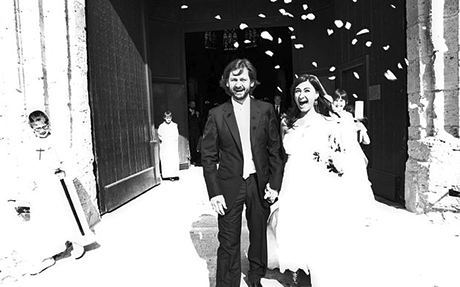
Believe me, that was like poetry to me. I was like, okay, are you serious? Do you exist? Paul was a journalist for many years. He was at Reuters for 16 years. He understands intrinsically what I do. He’s totally passionate about his work, and he’s been supportive. He’s not threatened by my love for my work, and I think that’s one of the most important things in a relationship. I can be with someone where we’re partners. We understand each other, we respect each other, and we don’t assume that if you’re passionate about something else, it’s taking away from the relationship.
You put your loved ones through hell, not only when you’re kidnapped, but when you travel to dangerous places. Isn’t it just too egoistic?
It’s a selfish profession; it is difficult on our loved ones. I understand that. But our world is changing. It’s not that Paris and London are safe now in a way that other places are not, because the targets of terrorism are everywhere.
Your colleague said he can’t do this anymore. Have you ever been at this point?
After the kidnapping, I didn’t say I’m never gonna do this again. All of us thought, it would be difficult to move forward. I knew that I would step back for a little bit. I knew that I needed to figure out how I would keep doing it. But I never thought, I’m just gonna quit. That’s not the way I am.
What story satisfied you the most, and why?
Oh, I don’t have that. I’m sort of perpetually unsatisfied. I always think I’m a failure.
How did you realize that your life is a book?
I was never really convinced. To this day I’m still sort of shocked that people are reading it. After Libya I was going to do a photo book, and then Tim Hetherington and Chris Hondros were killed and I suddenly went into a tailspin and really didn’t want to do a photo book at that moment. Literary agents approached me after Libya, who said there aren’t many women who do this work and I should consider doing it.
Steven Spielberg bought the rights to your book.
… Steven Spielberg did not buy the rights. Warner Brothers optioned the rights …
Now you’re a story.
Certainly Steven Spielberg and Jennifer Lawrence have expressed interest, but it’s Hollywood and anything can happen between now and when they go into production. There hasn’t been a script written as yet. So I think it’s incredibly humbling. The most exciting thing for me is that people might pay attention to the issues that I care about. People actually watch Hollywood movies. It’s just one more platform to get out those issues my colleagues and I care about.
What’s more important to you: love or your work?
Now? That’s a hard question to answer. I would say, as I get older – probably – I don’t know. I can’t really answer it. I would say if you had asked me that question ten years ago I wouldn’t have hesitated to answer. But now, I can’t really give you a definitive answer.
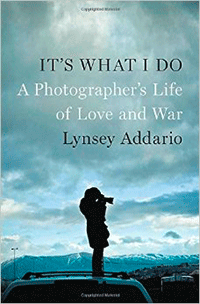
In March 2011, Lynsey Addario was photographing the Arab Spring in Libya, when she was abducted along with three colleagues. Following her release she wrote her memoirs. She has now published her moving autobiography, «It’s What I Do: A Photographer’s Life of Love and War», an excellent book about journalism. Addario describes in compelling fashion her sheltered youth in Connecticut, her first encounters with photography in Argentina and Cuba, and how passionately she pursues her profession. Even before 9/11, she had done features on Afghanistan. Later she returned to take pictures of the war in Iraq, captured cruelties in the Congo, depicted the hunger in Somalia. In a way that is both personal and honest, Addario recounts the difficulty of combining her job with living in a real relationship.
Hollywood studio Warner Brothers has optioned the rights to Addario’s autobiography. It has been announced that Steven Spielberg («E.T.») will direct and Jennifer Lawrence («The Hunger Games») has been pegged to play the lead. However, no screenplay has yet been written at this time.
